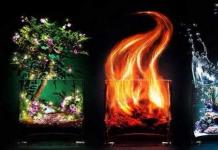Answered by Alexandra Lantz, 11/24/2013
The phrase "Kingdom of Heaven" was most likely used by Jesus as a name for his "school", i.e. of that circle of people who learn from Him here on earth, while the phrase "Kingdom of God" denotes that Heavenly reality, which will be fully revealed to people only after the second coming of the Lord and Savior Jesus Christ.
I bring to your attention an article by Doctor of Theology Alexander Bolotnikov.
the thematic approach to the study of the Bible leads to the formation of a system of "stamps", established concepts that have existed for centuries and are automatically applied in the interpretation of Biblical texts.
One example of such a cliché is the term "Kingdom of Heaven" (in Greek, basilea ton uranon), which occurs 31 times in the Gospels, exclusively in the Gospel of Matthew. In Orthodox culture, more than once one hears the expression "the kingdom of heaven to him", used in relation to a deceased person. If this phrase sounds from the lips of a believer, then it is understood unambiguously. The speaker wants the soul of this deceased to be in paradise. Thus, there is this undisputed stamp about the meaning of the expression "Kingdom of Heaven", as about the place where all the saved who have received eternal life will find themselves.
This is where a lot of difficulties arise.
Firstly, already at the very beginning of the Gospel of Matthew, in the so-called Sermon on the Mount, the following statement of Jesus is found: and whoever does and teaches, he will be called great in the Kingdom of Heaven "(). It turns out that in eternal life the saved are divided into classes and there is inequality. In the Church of the Latter-Time Saints, commonly referred to as Mormons, this verse is taken literally in this way. That is, there is a higher and a lower heaven. At the top are the great righteous, and at the bottom are the lesser ones. In other words, if a person “did not reach” a certain moral and spiritual bar, then he will still be saved, only he will be less. If this is so, then it becomes absolutely incomprehensible where the “lowest bar of righteousness” lies, below which salvation is impossible. It is for this reason that most Christian teachings reject the idea of grading those who have received salvation into greater and lesser.
However, the problem of more and less in the Kingdom of Heaven does not end there. Jesus speaks of his cousin John, who foretold his coming by his prophecies, in the following words: but the least in the kingdom of heaven is greater than him" (). If we apply the traditional Christian understanding of the Kingdom of Heaven as a place where the saved spend eternity, then we get a complete confusion. Is it possible that the greatest man on earth will not be able to overcome the bar of salvation? The next verse, “From the days of John the Baptist until now, the kingdom of heaven is taken by force, and those who use force take it by force” () generally threatens to cross out the whole essence of the doctrine of salvation by faith, and not by works, preached in Christianity since the time of Martin Luther.
The problematic nature of the phrase "Kingdom of Heaven" was noticed by the Church Fathers. Unlike the phrase "Kingdom of God", which is found in other Gospels, the expression "Kingdom of Heaven" occurs, as we said, exclusively in the Gospel of Matthew. Most of the parables of Jesus that are recorded by Matthew are parables about the "Kingdom of Heaven". In fact, Jesus uses 10 parables to explain to his disciples this seemingly simple term. One has only to glance at these parables in Matthew 13 to discover that the concept of "Kingdom of Heaven" is absolutely not equivalent to the concept of "paradise". For example, in the parable of the net (), the Kingdom of Heaven is a net into which good and bad fish fall; and only "at the end of the age" "the angels will separate the evil from the righteous." It is obvious that the seine is not a paradise in which, by definition, there can be no evil. Similarly, with the parable of wheat and tares (, 37-44). Here, in this parable, the Kingdom of Heaven is specifically likened to the work that Jesus does on earth. Those who follow him are called “sons of the kingdom,” but there are also “sons of the evil one,” who were uprooted during the harvest “at the end of the age.” Moreover, when Jesus gives an explanation of the parable of the tares in verses 27-44, he directly says that at the end of time the Son of Man “will send His angels, and they will gather from His Kingdom all stumbling blocks and those who do iniquity.” It is clear that in paradise there are neither temptations nor those who do iniquity. That is why the Church Fathers believed that the "Kingdom of Heaven" is the Church of Christ itself, in which there are "wheat and tares."
However, such an interpretation on the basis of the above parables does not help in any way to explain the "hierarchy" mentioned in the two texts of the Gospel of and 11:11. And even if one makes an assumption that contains the idea of a church hierarchy, then this in no way can explain why John the Baptist, the greatest of those born of women, found himself in the lowest position in the church.
Surprisingly, even most of the exegetical commentaries on the Gospel of Matthew, compiled by both conservative and historical-critical scholars, provide a very streamlined and non-specific explanation of the use of the term "Kingdom of Heaven" in the above texts. This confirms our assumption that Christianity often uses established clichés to fit the biblical text. But the second reason for this streamlining is that for these scholars, most of whom are Protestants, it is very difficult to internally agree with what Jesus says at the beginning of his Sermon on the Mount.
In order to understand the meaning of the words "Kingdom of Heaven", it is necessary to study in detail the context of the Sermon on the Mount, of which this phrase is a part. The sermon begins with the 17th verse of the 5th chapter:
“Do not think that I came to destroy the law or the prophets: I did not come to destroy, but to fulfill. For truly, I say to you, until heaven and earth pass away, not one jot or one tittle will pass from the law until all is fulfilled. So, whoever breaks one of these least commandments and teaches people so, he will be called the least in the Kingdom of Heaven; but whoever does and teaches, he will be called great in the Kingdom of Heaven. For I tell you, if your righteousness does not surpass that of the scribes and Pharisees, then you will not enter the Kingdom of Heaven.
Verse 17 is often understood by many Christians to be exactly the opposite, as if Jesus came to fulfill the law so that Christians would no longer be under its burden. The problem with this understanding lies in the fact that in Christian theology the concept of "Torah", translated into Greek by the word nomos (law), is perceived solely as a set of some rules and regulations that God specially invented in order to burden the Jews with them. However, in Hebrew, the concept of "Torah" is interpreted much broader. It comes from the Hebrew noun ohr, light, and is perceived as God's revelation or enlightenment, as recorded in Psalm 18: “The law of the Lord is perfect, strengthening the soul; The revelation of the Lord is true, making the simple wise. The commandments of the Lord are righteous, gladden the heart; the commandment of the Lord is bright, enlightening the eyes.
Based on what is written in verse 18, the Torah occupied a priority place in the teachings of Jesus. Moreover, his statement about the jot and the dash clearly does not encourage modern attitudes towards detailed researchers of the laws of the Torah, who are considered formalists and letter-eaters in many Christian circles. However, in the words of Jesus, written in Greek as iota et he mia keria (one iota and one dash), there is very important information. The fact is that in this context, iota (י) is not used in the meaning of the smallest letter of the Hebrew alphabet. The word keriah, translated as a line, is interpreted by many commentators as an element of the letters of the Hebrew alphabet. Indeed, from the point of view of writing, the Hebrew letters can be divided into simple elements, where the line is a straight line in the letter, and the iota is a rounded one. In other words, even if you look at any first grader who is learning to write, he is first trained to draw the elements of letters. Thus, contrary to the opinion of many commentators, Jesus is not talking about some abstract small part of the law, but about the letters of the Torah, or rather about the accuracy of their writing.
Unlike modern alphabets and scripts, first-century Hebrew written with primitive tools on the rough surface of leather or papyrus is not easy to read. For example, even with the typographic quality of the fonts, Hebrew beginners have difficulty distinguishing between the letters bet ב and kaf כ or dalet ד and resh ר. And in ancient texts, the situation is even more complicated. In particular, the letters Yod (Yota) י and Vav ו, as can be seen in the letter, differ only in the presence of a vertical line, which, as it were, continuing the letter Yod, makes the letter Vav out of it. As you can see, the Hebrew text does not forgive a careless attitude, and therefore, both in ancient times and today, very high demands are placed on both the sofer, the scribe, and the reader of the text. After all, incorrect reading or spelling of letters can lead to distortion of the text of the Torah.
So, if in verse 18 Jesus says that he does not intend to change a single letter in the Torah, then it turns out that He is the most important “letter-reader”. However, in early Judaism, this literalism was of the utmost importance. The fact is that both in the first century and now, every Jew who wants to seriously study the Torah had to become a student of a rabbi in a yeshiva. The term yeshivah in Hebrew comes from the verb yashav, to sit, and, in modern terms, means a study session. In a literal sense, this "session" looked like this: the students, sitting around the rabbi, studied the Torah. The Talmudic aggadah tells how the famous Jewish leader of the late first century, Rabbi Akiva, at the age of forty, together with his son, sat down to study with Rabbi Eliezer and began with aleph and bet. In other words, in the first century the study of the Torah began with learning the basics of literacy. After all, ordinary people at that time did not know how to read and write, and without this it is impossible to study the Torah.
It turns out that in the Gospel of Jesus, he speaks of the program of his yeshiva. This is why Jesus is constantly referred to as "rabbi" or teacher. Moreover, the disciples of John the Baptist, after he pointed them to Jesus, immediately turned to him with the words “rabbi, where do you live” and followed him. At that time, most of the famous rabbis were very poor people and gathered students at home. Thus, we see that Jesus began his ministry by opening a yeshiva, in which he began to recruit disciples. If you walk through Brooklyn today, you can see a yeshiva at every intersection. Each yeshiva bears either a name that separates it from others, or the name of its founder. In the early centuries, most yeshivas bore the names of their founders. For example, at the end of the first century BC, two rabbis, the founders of Pharisaic Judaism, Shammai and Hillel, founded their yeshivas, which were called Bet Shammai and Bet Hillel. Jesus, on the other hand, decided not to call his yeshiva by his own name, but called it, according to what is written in the Gospel from the Hebrew Malchut Ashamayim, "Kingdom of Heaven." That is why in one of the parables about the "Kingdom of Heaven", in the parable of the tares, Jesus calls his disciples b'nei Malkut, the sons of the kingdom (), and on the basis of the parable it is clear that the concept of b'nei Malkut is not limited only to the circle of his 12 apostles and even a circle of 72 close to him. Just as the yeshivas of Bet Shammai and Bet Hillel existed after the death of Shammai and Hillel until the time of the destruction of the Temple, and were taught by the followers of these rabbis, the Yeshiva of Jesus exists until the "end of the age" and the followers of Jesus study and teach there.
The name "Kingdom of Heaven" Jesus chose for his yeshiva was not accidental. Jesus deliberately emphasizes the contrast between his attitude towards the Torah and the attitude practiced in the yeshivas taught by the disciples of Shammai and Hillel. By the end of the 1st century BC in rabbinic Judaism, the understanding was formed that the correct interpretation of the Torah is that which is supported by the majority of rabbis. So, for example, of the two yeshivas of Shammai and Hillel, which are constantly competing with each other, only the interpretation of the Torah given by Hillel's disciples is recognized, due to the fact that there are more of them. Taking out of context the words "she is not in heaven" recorded in the book, the rabbis ascribed to themselves the final right to decide what is truth. By naming his yeshivah the “Kingdom of Heaven,” Jesus wished to emphasize that the interpretation of the Torah is the prerogative of the Almighty.
Thus, Jesus' Sermon on the Mount is, in fact, Jesus' presentation of his yeshiva. That is, in the first 16 verses of the 5th chapter of the Gospel of Matthew, known as the “commandments of the beatitudes,” Jesus formulates the requirements that he makes for those who want to learn from him. Then, in verses 17-20, he outlines the essence of his "study" program, which is based on loyalty to the principles of the Torah and the traditions of its study. That is why, in this context, Jesus says that any of his disciples who violates the slightest commandment of the Torah and teaches it to others will be called the least in his yeshiva, that is, the Kingdom of Heaven. The Greek word luo, "to untie," translated in the Russian Synodal Bible as "to break" in rabbinic Judaism, has a deeper meaning than mere fulfillment. Luo most likely conveys the rabbinical term matir, to allow. In the Hebrew of the Mishnah, the two terms matir and assir - permit and forbid - are used in relation to rabbinical halachic decisions, which are legal norms in Judaism. From the use of the verb luo, it follows that Jesus addresses His disciples as future rabbis. And, to put it in modern language, he warns them that if, having learned from him, they “unleash” with their rabbinic authority, that is, allow the violation of even the smallest commandment, then he will “put them a deuce.”
Understanding the "Kingdom of God" as the name of Jesus' yeshivah also helps to understand the meaning of Jesus' words to John the Baptist. He is called the lesser of the lesser in the "Kingdom of Heaven." The story of the baptism of Jesus is recounted in all four Gospels, but only the Gospel of John details how the disciples of John the Baptist, leaving him and calling Jesus a rabbi, actually moved into his newly opened yeshiva. For this reason, John says that Jesus must grow and John the Baptist must decrease. Thus, the disciples of John the Baptist, having completed their studies with him, went to study with Jesus. It turns out that the yeshiva of Jesus is an "educational institution" of a higher level. Therefore, in the 11th verse of the 11th chapter of the Gospel of Matthew, it is said that even the most novice student of the Jesus yeshiva is a graduate of John the Baptist who has passed to a higher level of spiritual education.
Read more on the topic "Interpretation of Scripture":
I often hear: "Let the earth rest in peace." It is clear that this is "atheism". But what do they really want, what is the meaning of this phrase? Lyudmila, Pushkino.
First of all, it must be said that the expression “let the earth rest in peace” does not have atheistic roots, but pagan ones. This expression originates from ancient Rome. In Latin, it will sound like this - " Sit tibi terra levis". The ancient Roman poet Mark Valerius Martial has the following verses: « Sit tibi terra levis , molliquetegaris harena, Ne tua non possint eruere ossa canes". (May the earth rest in peace to you And softly cover the sand so the dogs can dig out your bones )
Some philologists believe that this expression was a tomb curse on the deceased. However, we have no reason to say so, because this expression was used even before Martial. On ancient Roman tombstones, you can often see such letters - S T T L- this is an epitaph from - " Sit tibi terra levis" (rest in peace). There were options: T L S – « Terra levis seat"(Let the earth rest in peace) or S E T L — « Sit ei terra levis(Let this earth rest in peace). Currently, a similar epitaph can be found in English-speaking countries, where tombstones often have the inscription - R.I.P. (Rest In Peace) - rest in peace.
That is, the expression “let the earth rest in peace” is much older than atheism and carries precisely religious connotations, and not atheism. Can a Christian use this expression? Certainly not, because Christianity is fundamentally different from pagan ideas about the afterlife of the soul. We do not believe that the soul is in the earth along with the decaying body. We believe that, having died, the soul of a person goes to God for a private judgment, which decides where it will expect the general resurrection on the eve of Paradise or on the eve of hell. The pagans had a completely different idea. They wished that "the earth was fluff", meaning that it did not press on the bones of a person and did not cause discomfort to the deceased. By the way, hence the pagan fears of “disturbing the dead” and the myths about the resurrected skeletons, etc. That is, all this points to the pagan belief that the soul can stay next to its body or even in the body itself. Hence the wishes.
I also often hear people use the expression “let the earth be down”, but I have never seen a person who would put exactly ancient pagan content into this expression. Mostly among people untrained in faith, the expression “let the earth be down” is used as a synonym for the words “Kingdom of Heaven”. You can often hear these expressions in conjunction.
Here you need to have reasoning and a sense of spiritual tact. If you heard that a heartbroken person says at the wake “let the earth rest in peace”, then this probably will not be the best moment to reason with him or lead discussions. Wait for the time and when an opportunity presents itself, tell the person very carefully that Orthodox Christians do not use such an expression.
REMEMBERING THE LOST: PECULIARITIES OF REMEMBERING IN GREAT LENT
During Great Lent there are Sabbath days of special prayerful commemoration of the dead - parental Saturdays of the 2nd, 3rd and 4th weeks of Holy Forty Days.
Christian love prompts us to pray for the dead, by which we are all mutually united in Jesus Christ and constitute spiritual wealth. The dead are our neighbors, whom the Lord bequeaths to love as ourselves. God does not say: love your neighbors while they live.
On Holy Fortecost — the days of Great Lent, spiritual feat, the feat of repentance and doing good to others — the Church calls on the faithful to be in the closest union of Christian love and peace not only with the living, but also with the dead, to make prayerful commemorations on the appointed days of those who have departed from this life. In addition, the Saturdays of these weeks are appointed by the Church to commemorate the dead also for the reason that on the weekdays of Great Lent no funeral commemorations are performed (this includes funeral litanies, litias, memorial services, commemorations of the 3rd, 9th and 40th days after death, forty-mouthed), since there is no daily full liturgy, with the celebration of which the commemoration of the dead is associated. In order not to deprive the dead of the saving intercession of the Church on the days of the Holy Forty Days, the indicated Saturdays are singled out.
In pre-revolutionary times, each family had a list of the names of all the deceased members of this family - "Pomyannik". So, they prayed even for those whom the oldest of the living family members did not remember. Now this tradition has been lost by most families, and even when performing a commemoration, many believers do not know how to properly commemorate deceased loved ones.
Priest Andrei Bezruchko, rector of the St. Nicholas Church in Voskresensk, cleric of the Church of the Resurrection of Christ in the village of Voskresenskoye answered questions regarding the commemoration of the departed.
Why does the Orthodox Church introduce special days of commemoration - parental Saturdays, after all, commemoration, so, is performed at the liturgy?
The point is that liturgies are not celebrated in parish churches every day; there is no such technical possibility, in modern terms. In order to celebrate the liturgy, it is necessary that, in addition to the priest, there are singers, sexton, and, of course, those who pray. Therefore, in the middle of the week, not every church has a service, namely, a liturgy. But on Sunday, in every active church, liturgies are celebrated. This is not enough to commemorate the dead, because this day happens only once a week. Therefore, for a special commemoration, parental Saturdays and days of commemoration of the dead are allocated, on which a special prayer for the dead takes place.
In Great Lent, the full liturgy cannot be performed during the week, therefore, there can be no commemoration of the dead on these days. From Monday to Friday (on weekdays) of Great Lent, a full Liturgy is not celebrated in any church - it is not supposed to be served on Wednesdays and Fridays or on major holidays, the Liturgy of the Presanctified Gifts. At this liturgy, neither a commemoration of health nor repose is performed, because the days of fasting are days of repentance, days of special prayer, when a person goes deep into himself and the church structure of the service itself does not leave time for long commemorations of the departed, except for a brief funeral litia, which is laid after the 1st hour. And, therefore, in Great Lent, the 2nd, 3rd, 4th Saturdays are determined, which are called the days of commemoration of the departed - on these days a special time is given for prayer for the departed. On the eve, the 17th Kathisma is read (this is when they pray for the dead). It speaks of the recompense of the righteous and sinners from God, of their accountability before God for their deeds, and therefore, this Kathisma in the Psalter is the most appropriate on this day and the Church Charter determines to read it on the eve of Saturday. And already on the very Sabbath day of commemoration of the dead, a liturgy and memorial service is performed, as a prayer for the dead, where the dead are commemorated.
When are parental Saturdays on the calendar, and what other special days have the Orthodox Church set for commemoration of the departed?
- Parental Saturdays are called several days in the church calendar: Myasopustnaya, Trinity and Dmitrievskaya parental Saturdays. The rest of the days in the Church calendar are the days of commemoration of the dead. Although, on all these days, they commemorate the parents of the deceased, and relatives and friends of Orthodox Christians, Orthodox slain soldiers, but the names differ in the structure of the service itself, that is, in the name of the days of commemoration of the dead, it determines the very structure of this prayer for the dead. For example, if the parental Saturday is Trinity, Myasopustnaya and Dmitrievskaya, then these days the service is more filled than on other days of commemoration of the dead, with lengthy prayers, including troparia, stichera, canons.
In addition to the usual days of commemoration of the departed: three parental Saturdays, 2nd, 3rd, 4th Saturdays in Great Lent, there are other days of commemoration of the departed - Radonitsa (Tuesday of the second week after Easter), since on the Paschal week itself there are no large prayers for the dead, there is only a secret prayer that takes place in the altar, and there is no common prayer for the dead. They are transferred to Radonitsa, although the structure of the service performed on this day is not so abundantly filled with prayers for the dead.
The days of commemoration of the dead are September 11, on the day of the beheading of John the Baptist, the dead are also commemorated, the date has come historically - it is customary to commemorate Orthodox soldiers who died in the Patriotic War of 1812 on this day, they commemorated this day and so this day remained for commemoration, and not only the dead warriors.
Also today, on May 9, the deceased soldiers in the Great Patriotic War are commemorated. On this day, warriors are commemorated, although other deceased relatives can also be commemorated.
Another day of commemoration of the dead is the day of commemoration of the dead, who died during the years of persecution for the faith of Christ, repressed people in the 30s, in godless times. Among the millions of those who were shot there were many Orthodox Christians, all of them are commemorated in a special prayer on the day of the New Martyrs and Confessors of Russia - this is the last Sunday of January (after January 25). On this day, after the prayerful commemoration of the saints, we turn to the repose of the souls of the departed.
There are other days of commemoration of the dead, they are not in the church calendar, but with the blessing of His Holiness the Patriarch they are celebrated. For example: about those killed in an accident, about the dead liquidators of the Chernobyl nuclear power plant, etc.
- What should a believer do on parental Saturday in order to commemorate deceased loved ones?
First of all, prayer for them, prayer in the temple, prayer at home, because there are people who, for good reason, cannot attend church on this day. Therefore, they can fervently and heartily pray at home for their deceased relatives - in their private prayer at home. In the usual Prayer Book there is a “Prayer for the Dead”. On the eve, you can give notes with the names of the deceased to those who go to the temple on this day. You can visit the church shop the day before and hand over a note so that they remember this day, put a candle, because a burning candle is like a symbol of the burning of the human soul during prayer. We pray for the departed, and they feel our prayer and their afterlife from our prayer becomes better, becomes blissful. Of course, this depends on the strength of our prayer, and although we cannot make such a prayer, as the saints did, so that overnight through our prayer the departed would immediately be in paradise, but to the best of our ability in prayers, we remember them, envelop their afterlife .
- In the "Prayer for the Dead" there are words “God rest, Lord, the souls of your departed servants: parents ...” , what words should be pronounced if the parents of the supplicant are alive?
You can say grandparents, they include grandfathers, great-grandfathers, all deceased members of the clan, therefore Saturday is also called parental, because we pray for the departed of our clan.
- How to write names in notes correctly if the names of those who are commemorated are Yuri, Svetlana and Eduard?
All names in the notes should be given in church spelling, for example, George, not Yuri, Fotinia, not Svetlana. Some people, pronouncing the name in Greek, can calmly pronounce it in Russian, for some names there is no barrier between languages. But, nevertheless, you need to be guided by the local charter: if the temple accepts with that name, serve it, if not, then it's okay if you correct the name.
But there are rare names that have no interpretation in church calendars, for example, Eleanor, Edward, Rubin, etc. Therefore, you should write the name given at Baptism, and if it is unknown, resolve this issue with the priest.
- Does a person need to think about the afterlife on parental Saturday or on the day of remembrance of the dead?
A person needs to think about the afterlife not only on this day, but every day of his life. The Proverbs of Solomon says: “In all your deeds, remember your end, and you will never sin…” This is the path to a sinless life. If we think that we have to stand before God and give an answer for our deeds, then every day in our life we will try to spend piously, commit less sins.
On the days of commemoration of the dead, you need to think about your own afterlife, and about the afterlife of deceased relatives. Of course, all these thoughts of a normal person who understands his spiritual path, follows it, strives to climb the hierarchical ladder of virtue.
- What is the meaning of the memorial meal?
Those present, eating at the meal, commemorate the deceased relatives, for whom this meal is being prepared. This is an important point, because there is a saying “The well-fed does not understand the hungry.” When we are full, we do not think that there are people who are hungry, who need to be fed. Often, when the commemoration is held, many people come there to eat - there is no opportunity to eat at home. Therefore, being present at this meal, they will commemorate our deceased relative with a prayer. The meal itself is an almsgiving done for the deceased relatives, because those expenses that went to it, this is the sacrifice.
Question about attendees. It should not be a circle of people who interest us for profitable purposes in order to benefit from them. Therefore, we must invite poor people to the commemoration who need to be fed.
Of course, the main thing in commemoration is prayer, but, nevertheless, the memorial meal is a continuation of this prayer. The meal in the church charter is a continuation of the service, its integral part. Therefore, being present at the memorial meal, a person is present at the divine service.
- Are alcoholic drinks allowed?
The church charter does not prohibit the use of alcoholic beverages at the memorial meal. But sometimes commemoration turns into drunkenness, from commemoration into sin. Therefore, everything should be in moderation. The use of alcoholic beverages is possible, but I advise those who abstain not to drink, and those who want to drink do not commemorate alcohol, but commemorate with a meal, and drink alcohol so that they do not raise their glasses, commemorating a deceased acquaintance.
Is it right to leave sweets, cigarettes (if the deceased was a smoker) or even glasses of alcohol in the cemetery?
Some people think that if the deceased smoked during his lifetime, then after his death, cigarettes should be brought to the grave, then, following this logic, if a person liked to drive a car, then he needs to drive a car to the cemetery. What else did you love? Dance - dance on the grave. Thus, we are returning to paganism, then there was a trizna (rite), which just did not happen there. We must understand that if a person had some kind of earthly addiction, it remains on earth, but this does not exist in eternal life. Of course, it is inappropriate to put cigarettes or glasses of alcohol. You can leave sweets or cookies, but not on the grave, but on a table or bench, so that a person comes and commemorates this person. And to scold, for example, children in that. that they collect sweets is not worth it - they are placed in order to remember.
The grave must be kept clean, and nothing from food should be placed on the grave itself. In the absence of a person, the birds sit there and shit, and it turns out that the grave is well-groomed, the fence is painted, and the birds or dogs disturb the order - they scatter candy wrappers, etc.
The best way out is to distribute candies and sweets to those who need it as alms.
- How to speak correctly"Rest in peace"or?
An Orthodox Christian will always say: "Rest in peace" and the atheist says: "May he rest in peace", because he does not believe in the Kingdom of Heaven, but, although, wishing something good, let him say so to his relative. But an Orthodox Christian needs to say correctly: "Rest in peace".
What kind of people should not be commemorated in the temple?
- The temple does not commemorate suicides and unbaptized by name. In common prayer, when we come to church to pray, we can give any petitions to the Lord God in our hearts, in our minds. Of course, when a person has unbaptized deceased, or suicidal deceased, one cannot forbid to turn to the Lord in mental prayer - the Lord himself knows whom, how to determine in the afterlife.
There are cases when suicides are blessed to be buried in absentia. And when the funeral service is held in absentia, in the Diocesan Administration, after the commemoration of the dead, they say that the commemoration in the temple of this person is at the discretion of the rector of this temple.
In the Church Charter for resolving controversial issues there is an expression "If the abbot pleases", and this is understood in such a way that if the rector allows, you can submit notes, if not, it means that the priest is guided by the statutory principles.
- Is it possible to commemorate them with a home prayer?
In prayer, no one limits, although, you need to understand that the Lord himself will judge at the Last Judgment. At home, we can pray for everything, not only for people, but also for dispensation in the family and affairs.
- If a person dies during Lent, how can he be commemorated during the week?
In Great Lent there are some deviations from the rules of the usual commemoration. The church charter says that if a person dies during Great Lent, then on the week, neither on the 9th nor on the 40th day, they are not commemorated, but commemorations are arranged, either on the proper Saturday following this day or on the previous Sunday . For example, if 9 days need to be celebrated on Tuesday, then it is better to collect the commemoration on the previous Sunday.
Kingdom (kingdom) of heaven to whom. Obsolete High An expression used to wish the deceased an afterlife in paradise. - Our wife, Avdotya Petrovna, has died… Terenty, looking at the icon, crossed himself. - God rest her!(M. Gorky. Three).
Phraseological dictionary of the Russian literary language. - M.: Astrel, AST. A. I. Fedorov. 2008 .
See what the "Kingdom (kingdom) of heaven" is in other dictionaries:
Kingdom (kingdom) of heaven- to whom. Razg. Obsolete Wishing the deceased an afterlife in paradise (used when referring to the deceased). FSRYA, 512; BTS, 1457; Versh. 4, 113...
Kingdom of heaven- This article is about the phrase; For the film, see Kingdom of Heaven (film). The Kingdom of Heaven (also the Kingdom of Heaven, Hebrew מלכות השמים, Malkuth haShamayim, Greek ή βασιλεία τών ουρανών) is a Semitic expression in which "heaven" replaces the name of God ... ... Wikipedia
Kingdom of heaven is an article about the phrase. for the film, see "Kingdom of Heaven" "Kingdom of Heaven" (Greek: ή βασιλεία τών ουρανών) is a Semitic expression in which heaven stands for the divine name (Luke 15:18). Known from the Gospel of Matthew, ... ... Wikipedia
kingdom (kingdom) of heaven to him ( !}- Wed. I had an uncle, the kingdom of heaven be upon him! I add the latter only because it is already customary when people talk about the dead... Grigorovich. My uncle Bandurin. Wed All in the father of a parent, do not be remembered by that, the kingdom of heaven to him ... Pride ... Michelson's Big Explanatory Phraseological Dictionary
Kingdom of heaven- The expression the kingdom of heaven is especially common in the Gospel of Matthew. In other Gospels and Epistles, it is replaced by the expression Kingdom of God, the kingdom of Christ, or simply by the word: kingdom. It seems to have a threefold meaning and of course... Bible. Old and New Testaments. Synodal translation. Bible encyclopedia arch. Nicephorus.
The kingdom (kingdom) of heaven to him!- Kingdom (in) him heavenly! Wed I had an uncle, the kingdom of heaven be upon him! I add the latter only because it is already customary when people talk about the dead... Grigorovich. My uncle Bandurin. Wed All in the father of a parent, don’t be that ... ... Michelson's Big Explanatory Phraseological Dictionary (original spelling)
Kingdom of heaven- See Kingdom of heaven (KINGDOM) ... Big dictionary of Russian sayings
KINGDOM- (kingdom) of heaven to whom. Razg. Obsolete Wishing the deceased an afterlife in paradise (used when referring to the deceased). FSRYA, 512; BTS, 1457; Versh. 4, 113. Pass over into the kingdom of heaven. Book. Die. Mokienko 1990, 98 ... Big dictionary of Russian sayings
Kingdom of God- (The Kingdom of Christ, the Kingdom of Heaven) is depicted by the Gospel, in contrast to the Jewish ideas about the kingdom of the Messiah, as an internal, spiritually moral C., for entry into which the conditions of purely moral repentance and faith are also required ... Encyclopedic Dictionary F.A. Brockhaus and I.A. Efron
kingdom- (kingdom), the Kingdom of God rule of people or God A. Themes in the Bible KINGDOM as a theme: 2 Samuel: 2 Samuel 5:12 3 Samuel: 1 Samuel 4:21 B. Kingdoms of the earth 1. The main kingdoms of the biblical history Kingdom of Bashan: Numbers 32: 33 Kingdom of the Amorites:… … Bible: Topical Dictionary
Books
- Russian monasteries. Southern Urals and Trans-Urals, Feoktistov A. A., Kuznetsov A., Boev A. K., Nechaeva M. Yu.
Pavel Velikanov about the Kingdom of Christ
He came to his own, and they did not accept his own ...
If you carefully read the Gospel and ponder all the words of Christ about the Kingdom of God, it becomes obvious: it was this teaching that became fatal for His earthly life. The Jews longed for the Kingdom, raved about the King - but not the same as Christ turned out to be. And the Savior was ready for this: unlike many false prophets and false messiahs, He did not care at all about the external effect of His preaching. He knew what he was doing. And he perfectly understood what the price was for words, and what was for deeds. Suffice it to recall how, after the words about the need to eat His Body and drink His Blood as an indispensable condition for life with God, many turn away from Him and leave. And so, instead of, as they would say today, “change tactics” and “make adjustments” for greater effectiveness of the sermon, Christ turns to His closest disciples: “Don’t you want to leave too?” ...
The doctrine of the Kingdom of Heaven is the key to the entire gospel narrative. From the point of view of the Jews, all this is nothing more than some kind of abstraction, in no way connected with the realities of life. Therefore, He Who so boldly dares to assert His Sonship of God - and thereby turn this "incomprehensible fiction" into Divine Revelation - must be killed, and killed shamefully, as an edification to all others, so that it would not be customary for anyone to try to destroy what - as they believed Old Testament Jews - for centuries preserved the authenticity and integrity of the Jewish people. Who else, except the Jews, perfectly understood and remembered what the Kingdom is? Saul, David, Solomon - all of them were inscribed in the history of the Jewish people not only as saints and prophets, but also as the builders of that very kingdom, through the ruins of which this newly-appeared Prophet now walks and tells strange things about the Kingdom of Heaven or God!
Christ's inquirers - Jews - are very specific people in their attitude to everything that concerns areas of life that are important to them. The richest experience of survival in a hostile environment taught them exceptional pragmatism, and the complex provisions of the Mosaic Law delicately honed this ability for quick rational response from generation to generation. And when you read how they listen to the words of Christ about the Kingdom, there is a feeling that this incessant aggressive background of questions literally rings in the air: “Where is the Kingdom, show it to us! When will this kingdom come? And with what it can be compared, how to feel it, touch it, see it? Is it all a bluff?…”
And the Answer - was before their eyes, walked, talked, healed the sick ... Only later, after the Resurrection, the apostle John will remember with a deep feeling of sincere amazement - how they could see with their eyes, touch with their hands, the Word of Life, the Son of God, eat and drink with Him. This hardly fits into the consciousness of even His closest disciples - those who saw Him Risen. What then to say about those who looked at this wandering preacher like that, out of the corner of their eye, in passing - there are a lot of all sorts of things going around here ...
Vertical or horizontal?
When we talk about the Kingdom of Heaven, we are immediately confused by its "heavenliness", which is subconsciously perceived by us as something not quite real, exclusively spiritual, or at least - unearthly or beyond the grave. However, in the gospel texts "Heaven" is a synonym for the name of God, and, accordingly, the "Kingdom of Heaven" is nothing but His, God's, reign on Earth - and only. But this is such a living and real presence of God in human life that it turns out to be the very pearl for which everything else is easily sold and forgotten. The Kingdom of Heaven is infinitely far from the state of "spiritual comfort" or "pocket God in the soul", with which our contemporaries so love to justify their practical godlessness. Here God comes to man precisely as King, Lord - and this revelation can neither be confused nor imitated. A king does not exist without his subjects: in the same way The Kingdom of Heaven appears only where there is a meeting of man and God- a meeting, the result of which for this person is a new life.
The Kingdom of Heaven is not food and drink, not power and might, not contentment and wealth. All this is a horizontal plane: and at any point in this space a new reality can appear - a vertical that is built only between God and man. The Kingdom of God is already here, among you - Christ says to His disciples: they look around in amazement, look around, not understanding that they only need to see themselves next to Christ. There is nothing to look for this Kingdom neither in time nor in space - it is constantly near.
But Christ is meek and long-suffering, He does not break into the soul as the Powerful Master, but stands at the door and only modestly knocks in the hope that those who are outside the door, inside, will hear and want to let it in themselves. Hence - such an abundance in His speech of images and comparisons that help to understand His teaching about the Kingdom. And at the same time - a constant emphasis: " Yes, I am the King, but not of the Kingdom that you all so dream of. My kingdom is different. It is where there are not power-hungry and proud, but meek and modest; where there is no pomp and religious hypocrisy, but childish simplicity and sincerity; where God is not a mental fiction, but the Living Lord, really present in life!" It is easy to imagine how difficult these words were to hear: just look around - who is to blame for our troubles today? Those in power? Thieves and bribe-takers? But what's the difference - all the same, the eye glides along the path knurled for centuries, and long before Christ this path had already been beaten. To paraphrase Christ's words about the Kingdom of God, one could say this: no matter how holy, sinless and full of all virtues ruler you set up, this will not solve the essence of our problems: after all, our main enemy is not somewhere outside, he is inside; More precisely, we are our own enemies number one.
Where does the Kingdom begin?
The Kingdom of God - the Kingdom of Heaven - comes already when a person finds his King and Lord: for Christians, this entry into the Kingdom is directly connected with the birth of water and the Spirit in the sacrament of Baptism. When the priest who is being baptized asks: “Do you believe Him?” - preparing to be born in the New Kingdom answers: “I believe, as the King and God!” Therefore, baptism is not just some kind of “cleansing” ritual, but a highly responsible moment: accepting Christ as his Lord and Savior, plunging into His death and rising with His Resurrection from the waters of the font, he takes an oath of allegiance to his Tsar and God. From now on, a person is no longer alone: he is in the service, he is “at work”, he does not belong to his desires and lusts, but works for his King and God, thereby manifesting His Kingdom in this world. But the Christian prays not only about this every day, when he asks in the Lord's Prayer "Thy Kingdom come": his prayer is not only about the fact that there will be more and more of these points of God's living and active presence in the world through His faithful subjects. Our hope and expectation is to see the moment when the vault of heaven will collapse, the stars will disappear, the dead will rise - this long, such an endlessly long cold night of sin will end, and a new Day will open, the Bright day of the Kingdom of Christ.
However, we must prepare for this day now. " Whoever has not seen Christ here in this life will not see Him there either.", - said the Rev. Barsanuphius of Optina.
“My kingdom is not of this world,” says Christ. And His followers, Christians, on the one hand, have no other world to live in, except for this one, by default hostile to Christ. But on the other hand, the Kingdom they live in - the Kingdom of Christ - is not of this world. This inner tension - from the inevitability of life in this world and the impossibility of living according to its worldly laws - turns out to be very productive in real life: this is how asceticism is born, the science of strategy and tactics in the spiritual war against sin and passions. It is in this deep inner tension that the Christian matures. Therefore, the Kingdom of Heaven is “needed”, is taken with effort, it “makes its way” only with the hands of the person himself, with his personal labors he wins for himself more and more new territories on enemy soil.
What our heart yearns for
The entrance to the Kingdom of Heaven is opened by the Sacrament of Baptism, and each time, blessing this Kingdom at the Divine Liturgy, the faithful to Christ undergo a serious test of their “professional suitability” for participation in this Kingdom. On the one hand, this unity of human faces turned to Christ forms the Church as His Body. On the other hand, this mysterious many-part and at the same time one Body turns out to be a court and witness for each member of the Church specifically of his conformity, his attunement to that Spirit, which gives life to this Body, the Holy Spirit.
And in order to get into this Kingdom, you don’t need to go somewhere or wait an agonizingly long time for it to come “in power and glory”: after all, it has already come, this Kingdom walked on our earth - and to this day it walks the feet of those who He considers him his King, who live according to the Gospel, fulfilling what He, Christ, expects from His brothers and friends. It is always there: if only the receiver of our soul is tuned to this frequency of the Kingdom of Heaven. And when this happens, the Christian becomes a living evidence of the objective existence of this Heavenly Kingdom already here and now. Ivan Ilyin once remarked that it is impossible to hide the light of religiosity - it will still break through and will shine on the world. The entire innumerable host of Christian saints are precisely such "fireflies", the torches of God's truth, but their strength is not in some kind of their own exclusivity, but in the fact that they all shone with the same light of the Kingdom of Christ - even each in his own way. But the source of their light has always been one - Christ.
This living presence of Christ, not only in the church community, but also in the soul of every Christian, was such an obvious and important criterion for the Apostle Paul that he dared to assert: “He who does not have the Spirit of Christ is not His, that is, not Christ!” (Rom 8:9). Christ Himself is the Kingdom of Heaven, and when He speaks about this Kingdom in parables, images, examples, He always speaks of Himself. Life with Christ, life according to Christ, life in Him is not an abstraction at all, but the most real reality for a church person.
And not at the level of feelings or sensations: this state of internal “synchronization” with the life of the Body of Christ turns out to be much deeper than any psychological experiences, it goes into the ontological sphere, into the area of the fundamental principles of being. Therefore, what happens in the temple, the Sacraments performed by the hands of the priest - all this resonates not with some external feelings, but with the elements of the earth and heaven: here the angels are not just present, but serve the priest in fear and trembling. And this invisible spiritual power becomes evident to souls pure in heart and open to God. Here, in the temple - His territory, His Kingdom - unless, of course, the temple is filled with faithful to Him - and not traitors and deserters. And there is nothing surprising in the fact that once, having just crossed the threshold of the temple, a person finds himself until the end of his days delighted with this new reality that has suddenly engulfed him from all sides - not ours, but that better, cherished, desired one - for which only the living human yearns. heart.
Paradise or Christ?
A Christian is not one who lives with the dream of going to heaven, but one who lives by Christ. For a believer in Christ, paradise both opens and can close already in this life. Therefore, for him, every day, every minute of this seemingly transient and therefore little meaning life is in fact priceless. And the “mechanical” placement of a soul untransformed by Divine grace in a place where the righteous and saints live will not change the quality of life: there is nowhere to escape from oneself, and one who carries in his heart the hell of self-love and passions will himself run away with contempt and malice to these "saints" and "hypocrites". Without becoming a subject of the Kingdom of God here on earth - there is too little chance of getting into it after death. Seeking Christ, His closeness, His tangible presence - not only in the temple and the sacraments, but also in the daily events of life - is not such a difficult task if you hear His commandments and try to fulfill them. And the commandment is really one: to be imitators of Christ, to live and be inspired by Him, to act as He acted; to think as He thought, to desire what He longed for. Strange as it may sound, but today we must speak about it at the top of our voices, again and again: Christianity is Christocentric, not “raecentric”, or, even worse, “sincentric”. For us, heaven is where Christ is, and not vice versa. And His Kingdom - whatever you call it - God's or Heaven's - is already here, on earth, with us, among us. If only we ourselves - in our hearts, in thoughts, words and deeds - are with Christ.
Viewed (2441) times


















